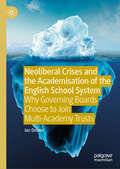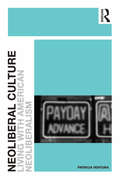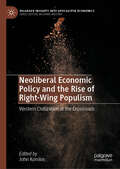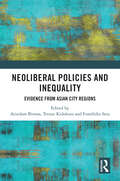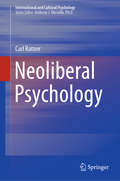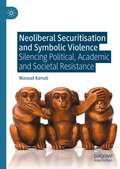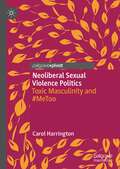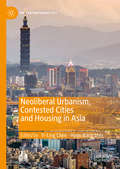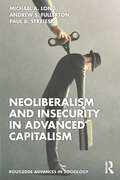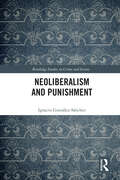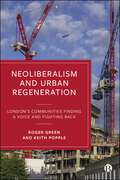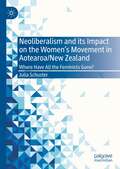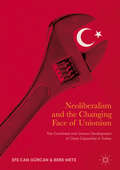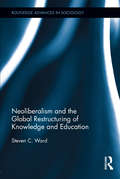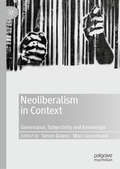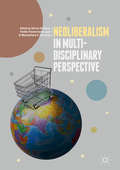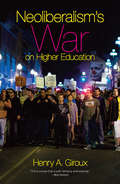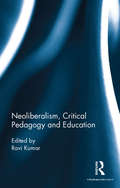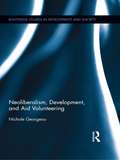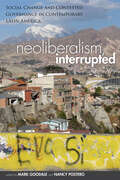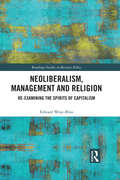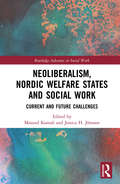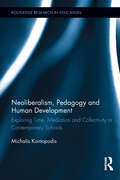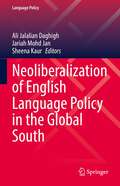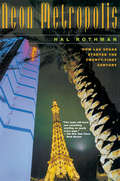- Table View
- List View
Neoliberal Crises and the Academisation of the English School System: Why Governing Boards Choose to Join Multi-Academy Trusts
by Ian DewesThis book examines the impact of neoliberalism on the academisation of the English school system. The growth of multi-academy trusts (MATs) has been a significant change in the English educational landscape. While some schools have been forced to join MATs, many of them have made this change because their governing board has chosen to do so. The author of this book examines the reasons why many governing bodies have still decided to join a MAT, despite numerous controversies linked to them. He applies the theory that neoliberalism perpetuates itself by creating crises which require more neoliberal policy solutions. Using three case-study schools, the extent to which various crises in the English education system have encouraged governing boards to join MATs is studied. The book will be of interest to academics and students of education policy, schooling, and the sociology of education.
Neoliberal Culture: Living with American Neoliberalism
by Patricia VenturaDeparting from the conventional understanding of neoliberalism as a set of economic and political policies favoring free markets, Neoliberal Culture presents a framework for analyzing neoliberalism in the United States as a culture-or structure of feeling- which shapes American everyday life. The book proposes five 'components' as the keys to any study of American neoliberal culture: biopower, corporatocracy, globalization, the erosion of welfare-state society, and hyperlegality, these five components enabling rich analyses of key artifacts of the neoliberal era, including the Iraq War, Las Vegas, welfare reform, Walmart, and Oprah's Book Club. Carefully organized according to its central themes and adopting a case study approach in order to allow for thorough, illustrated analyses, this book is an important tool for scholars and students of contemporary cultural studies, popular culture, American Studies, and sociology.
Neoliberal Economic Policy and the Rise of Right-Wing Populism: Western Civilization at the Crossroads (Palgrave Insights into Apocalypse Economics)
by John KomlosThis edited volume explores and makes explicit the links between neoliberal economic policies and right-wing ideology. The book focuses on the case of the US while situating these trends in the global political economy. The book brings together contributions from an interdisciplinary perspective, integrating economics, political science and sociology to examine the connections between the economic precarity generated by neoliberalism and the rise of the far right. The book argues that the creation of a flawed capitalist system has left a vacuum in policymakers’ ability to understand the impact of economic policies on human welfare and mental health, and can be directly linked to a right-wing populist movement driven by the frustrations associated with the transition from an industrial to a post-industrial economy. Chapters consider the history of neoliberalism and comparative studies of socio-economic conditions, before tackling specific issues associated with neoliberal policy, such as the demise of unions, the decline in manufacturing jobs, the gig economy, trickle-down economics, income inequality and the rise of elites in America. This book will be of interest to a broad range of readers, including those in politics, economics, sociology, industrial organization and labour studies.
Neoliberal Policies and Inequality: Evidence from Asian City Regions
by Arindam Biswas, Tetsuo Kidokoro and Fumihiko SetaThis book explores the discourse on urban and regional inequality within the framework of neoliberalism. It analyzes the widespread application of neoliberal policies in Asian city regions and identifies their influence on rising inequality. The book captures inequality through spatial and non-spatial policy narratives with empirical evidence from India, Japan, South Korea, Taiwan, and Thailand. The book uses analytics, narratives and simulation to unfold the opportunities and threats to urban regions that bear the impacts of globalization and neoliberal policies.Lucid and topical, this book will be an essential read for scholars and researchers of urban economics, urban and regional planning, urban studies, urban sociology, political economy, public policy, governance, development studies and Asian economy.
Neoliberal Psychology (International and Cultural Psychology)
by Carl RatnerThis provocative monograph defines the elusive concept of neoliberal psychology, focusing on its form, content, and cultural contexts and establishing it as a core feature of modern society. Its cross-cultural analysis examines the reality of neoliberal psychology in the globalized world, asserting that neoliberalism influences individuals’ sense of self, identity, and—regardless of country of origin—concept of nationality. Macro cultural psychological theory opens out neoliberal psychology in its most visible aspects, such as work life, sexuality, consumer behavior, and the shared vision of the good life. At the same time, the author identifies profound social inequities and other negative aspects of neoliberal society and discusses how they may be corrected. Included in the coverage: Snapshots of neoliberal society and psychology.A psychological theory for comprehending neoliberal psychology.Neoliberalism as a cultural, political, economic, ideological system.The neoliberal class structure of phenomena.Psychological and cultural emancipation, and macro cultural psychological theory. Since neoliberalism is the dominant social system in today’s world, and because it commands both strong support and strong criticism from diverse interest groups, Neoliberal Psychology will be of general interest to a wide readership. The book’s psychological focus is a new window into neoliberalism that is more accessible than more technical accounts of its economics and politics, and it should appeal especially to social science students and professors.
Neoliberal Securitisation and Symbolic Violence: Silencing Political, Academic and Societal Resistance
by Masoud KamaliThis book explores the consequences of the last three decades’ substantial neoliberal securitisation of freedom of speech, democracy and social security of racialised groups. Its empirical material contains in-depth interviews with racialised politicians, journalists, academics and civil society activists in Sweden. Like many other countries, Sweden has combined a neoliberal reorganisation of society with securitisation policies in which ‘the war on terror’ has played a central role. In order to understand the complexity of neoliberal securitisation policies and the analysis of the empiric material, the study makes use of central theoretical concepts, such as ‘the spiral of silence’, ‘symbolic violence’, ‘governmentalisation’ and ‘neoliberal racism.’ It will be of particular interest to students and scholars of political sociology, social policy and social work.
Neoliberal Sexual Violence Politics: Toxic Masculinity and #MeToo
by Carol HarringtonThis book locates #MeToo’s traction among elites with “womenomics” theories that attribute feminized poverty, welfare dependency, and sexual violence to traditional femininity and toxic masculinity. Such neoliberal anti-sexual violence policies seek to empower women through paid work and reform men through fatherhood. This volume shows that men’s movements and conservative concerns about “fatherless families” developed toxic masculinity discourse before popular feminism incorporated it. It analyses how discourse on #MeToo issues in the workplace reveals a shift away from representations of women as traumatized victims in need of empowerment toward a focus on men as both problem and solution, setting new standards for masculine workplace conduct. However, this discourse reproduces a toxic/good men binary that serves to consolidate a new form of hegemonic masculinity. The book concludes that neoliberal sexual violence politics obscures how globalization fosters inequalities and sexual violence by blaming these and other social ills on toxically masculine men.This book will be of interest to scholars whose research focuses on sexual violence, feminist studies, masculinity studies, and neoliberalism.
Neoliberal Urbanism, Contested Cities and Housing in Asia (The Contemporary City)
by Hyun Bang Shin Yi-Ling ChenConsidering Asian cities ranging from Taipei, Hong Kong and Bangkok to Hanoi, Nanjing and Seoul, this collection discusses the socio-political processes of how neoliberalization entwines with local political economies and legacies of ‘developmental’ or ‘socialist’ statism to produce urban contestations centered on housing. The book takes housing as a key entry point, given its prime position in the making of social and economic policies as well as the political legitimacy of Asian states. It examines urban policies related to housing in Asian economies in order to explore their continuing alterations and mutations, as they come into conflict and coalesce with neoliberal policies. In discussing the experience of each city, it takes into consideration the variegated relations between the state, the market and the society, and explores how the global pressure of neoliberalization has manifested in each country and has influenced the shaping of national housing questions.
Neoliberalism and Insecurity in Advanced Capitalism (Routledge Advances in Sociology)
by Paul B. Stretesky Michael A. Long Andrew S. FullertonThis book examines the relationship between neoliberalism and insecurity, beginning with the post‑World War II period and continuing up through the present. Neoliberalism – the dominant political economic perspective that elevates competition above all else at both the structural and individual levels – has increased the amount of insecurity (e.g., food, energy, job) across the world. It provides a theoretical and empirical analysis of how and why neoliberalism and insecurity have become intertwined over the last half century.The book takes a novel approach to the study of neoliberalism, insecurity, and their intersection. First, in addition to examining specific types of insecurity, the overall concept of insecurity is defined and theorized as a fundamental part of neoliberal capitalism. Second, to help bypass the structural versus individual binary that has come to characterize much of the neoliberalism literature, a field‑theoretic framework, heavily influenced by the work of Pierre Bourdieu, is employed.As such, it will be of great interest for researchers in neoliberalism, insecurity, and Bourdieu’s theory of practice, including advanced undergraduate students and graduate scholars from sociology, anthropology, geography, political science, and public health.
Neoliberalism and Punishment (Routledge Studies in Crime and Society)
by Ignacio González-SánchezExploring the expansion of the penal system in Spain during the first 40 years of democracy, this book puts forward the importance of studying punishment from a sociological perspective and examines the neoliberal penality thesis.Today, Spain has more police officers and more people in prison than 50 years ago and a tougher penal code than that which existed at Franco’s death; however, crime has not increased for three decades, while most of the hardening of the penal system has occurred after its stabilisation. Studying the development of penality in Spanish democracy, this book explores Loïc Wacquant’s proposal that the expansion of the penal system should be understood as a characteristic of neoliberalism. It examines the parallel and reciprocal development of three policies in relation to the gradual implementation of neoliberal ideas and highlights how the evolution of the labour market, social policies, and the penal system are linked to one another and to neoliberal ideas related to the sacralisation of the utilitarian individual and the role of the state.Advocating for a sociological study of state punishment and contributing to a better understanding of the implementation of neoliberal policies, Neoliberalism and Punishment will be of great interest to students and scholars of criminology, sociology, and politics.
Neoliberalism and Urban Regeneration: London's Communities Finding a Voice and Fighting Back
by Keith Popple Roger GreenLondon is a major global city which attracts a massive influx of capital while concentrating power and wealth in the hands of the few. Meanwhile, many communities suffer housing shortages, poverty and dispossession. How can its diverse communities fight back against exclusionary regeneration projects? This accessible book tells the story of the Voice4Deptford campaign in Southeast London, which has taken radical democratic and creative action to resist the destructive influence of neoliberalism at the community level. It shows how top-down change is challenged and, together with case studies from across London, offers powerful ways forward for other urban communities globally.
Neoliberalism and its Impact on the Women's Movement in Aotearoa/New Zealand: Where Have All the Feminists Gone?
by Julia SchusterThis book investigates how neoliberalism shaped the women’s movement in Aotearoa/New Zealand from the mid-1980s to late 2010s and looks at the future of the movement. Based on an empirical study that encompasses the three levels of the movement—individualised feminism, the work of women’s organisations, and state feminism—it explores how neoliberal rationality, promoted by governments over three decades, has impacted feminist identification and activism as well as political opportunities for organisations and institutions working within the movement. Exploring the diversity of feminist voices, the author analyses intersectional, (post)colonial and intergenerational debates within the movement in the context of neoliberalism’s influence on feminist values and strategies, and examines whether neoliberal rationality succeeded in depoliticising, individualising and fragmenting the movement. The book comes to the conclusion that despite some severe drawbacks, internal conflicts and changes of strategies, the women’s movement in Aotearoa/New Zealand has survived the impact of neoliberalism. This book will be of interest to scholars of Gender Studies, Sociology, Political Science, and Women’s History, as well as feminist activists.
Neoliberalism and the Changing Face of Unionism
by Efe Can Gürcan Berk MeteThis book provides a political, economic, and sociological investigation of how neoliberalism shapes 'working class capacities,' or the power of the working class to organize and struggle for its collective interests. Efe Can G#65533;rcan and Berk Mete discuss the global importance of the labor question as it pertains to Turkey. They apply the main theoretical framework of the combined and uneven development of class capacities to Turkish trade unionism. They also address Turkey's recent history of neoliberalization and its repercussions for class capacities, as mediated by national regulations, conservative unionism, and Islamic social assistance networks. Finally, the authors explore how neoliberalism generates intra-class fragmentation through public regulatory mechanisms and cultural differentiation in the sphere of social unionism.
Neoliberalism and the Global Restructuring of Knowledge and Education (Routledge Advances in Sociology)
by Steven C. WardThis book examines the influence of neoliberal ideas and practices on the way knowledge has been conceptualized, produced, and disseminated over the last few decades at different levels of public education and in various national contexts around the world.
Neoliberalism in Context: Governance, Subjectivity and Knowledge
by Simon Dawes Marc LenormandNeoliberalism in Context adopts a processual, relational and contextual framework, bringing together contributions from diverse national and disciplinary contexts, and bridging theoretical and methodological approaches to critiquing neoliberalism. The book presents arguments on the extent to which we are still living in neoliberal times, and illustrates examples of variation in the practice of neoliberalization and within neoliberal thought. The contributions also examine the mediation and significance of existing neoliberalism on subjectivity, and address the consequences of the neoliberalization of education for critical thinking generally, and for the critique of neoliberalism in particular. This collection will be of interest to students and scholars across sociology, international relations, urban studies, and media and cultural studies.To access an introduction by Simon Dawes, and an interview with Jamie Peck, download the front and back matter for free from SpringerLink.
Neoliberalism in Multi-Disciplinary Perspective
by Maximiliano E. Korstanje Adrian Scribano Freddy Timmermann LopezThis volume brings together well-versed authors from four continents to critically discuss the roots of neoliberalism and how academics use the word today. Neoliberalism has recently recycled and mutated towards new forms of radicalization where fear plays a leading role legitimating policies, which would otherwise be overtly neglected by citizens. The authors ignite a new discussion within social sciences, combining the advances of sociology, history, anthropology, communication and the theory of mobilities to understand the different faces and guises of neoliberalism.
Neoliberalism's War on Higher Education
by Henry A. GirouxNeoliberalism's War on Higher Education reveals how neoliberal policies, practices, and modes of material and symbolic violence have radically reshaped the mission and practice of higher education, short-changing a generation of young people.Giroux exposes the corporate forces at play and charts a clear-minded and inspired course of action out of the shadows of market-driven education policy. Championing the youth around the globe who have dared to resist the bartering of their future, he calls upon public intellectuals-as well as all people concer ned about the future of democracy-to speak out and defend the university as a site of critical learning and democratic promise.
Neoliberalism, Critical Pedagogy and Education
by Ravi KumarThis volume examines the role of neoliberalism and its impact on education in South Asia. It contends that education is in a state of crisis across the world. This is reflected not only in the way the state has withdrawn to pave way for private capital but also in the manner in which knowledge and ways of understanding the world are being challenged by manipulation and adverse influences. A process of ‘factoryisation’ is underway as disciplining of human minds and redefinition of the purpose of human existence are being geared to fall in line with the needs of private capital. The book brings together incisive contributions from India, Sri Lanka, Pakistan and Nepal to explore newer possibilities to deal with the educational crisis, and looks at a range of critical themes in education: pedagogy, teacher–learner relationship, teacher education, the state of the university, and policy. Rich in content, critical and insightful, this book will be a valuable addition for scholars and researchers of education and education policy, sociology, public policy and South Asian Studies.
Neoliberalism, Development, and Aid Volunteering (Routledge Studies in Development and Society #33)
by Nichole GeorgeouThis work comes at an important time of global crisis and change, where the world is ravaged by natural disasters, wars and poverty. This has increased the pressure on governments and other organisations, such as volunteer sending agencies, which provide aid, and we have seen an upward trend in the number of people volunteering abroad. Within this volatile environment, neoliberal ideology on how aid should be provided and implemented has become embedded in how policy is formulated. A market-driven model of aid provision has become the norm, and governments are increasingly focused on international development volunteering as a form of ‘soft diplomacy’. This is the first qualitative empirical study of international development volunteering. The book contributes theoretical knowledge on International Volunteering Sending Agencies (IVSAs) and examines practitioner experience in development volunteering in the context of emerging policy developments. Critical analysis highlights the impact of global and social changes and provides a nuanced understanding of development volunteer motivation, and the relationship between volunteers and sending agencies. The book also puts forward an agenda and model for volunteer sending that addresses the complexities and diversity of the volunteer experience.
Neoliberalism, Interrupted: Social Change and Contested Governance in Contemporary Latin America
by Mark Goodale Nancy PosteroIn the 1980s and 1990s, neoliberal forms of governance largely dominated Latin American political and social life. Neoliberalism, Interruptedexamines the recent and diverse proliferation of responses to neoliberalism's hegemony. In so doing, this vanguard collection of case studies undermines the conventional dichotomies used to understand transformation in this region, such as neoliberalism vs. socialism, right vs. left, indigenous vs. mestizo, and national vs. transnational. Deploying both ethnographic research and more synthetic reflections on meaning, consequence, and possibility, the essays focus on the ways in which a range of unresolved contradictions interconnect various projects for change and resistance to change in Latin America. Useful to students and scholars across disciplines, this groundbreaking volume reorients how sociopolitical change has been understood and practiced in Latin America. It also carries important lessons for other parts of the world with similar histories and structural conditions.
Neoliberalism, Management and Religion: Re-examining the Spirits of Capitalism (Routledge Studies in Business Ethics)
by Edward Wray-BlissThe use of non-secular, religious, concepts in contemporary managerial discourse to legitimise leadership, organisation and work has been undertheorised. Concepts such as organisational soul, Spiritual Leadership, a wider deification (and demonisation) of leaders, and the mantra of individual freedom each evoke long religio-historical roots. The deployment of such terms in the present to (re)enrol people into the service of capitalism speaks both to high levels of religious belief worldwide and, more specifically, to a history of religion intersecting with public life in the US—a context pivotal in the development and dissemination of managerialism and wider neoliberal discourse. Organised around the concepts of Gods, Devils, Soul and the Individual this book will show how these concepts are being employed in current managerial, leadership and organisation discourses, critically examine the religio-historical and philosophical roots of such, and demonstrate how the religio-historical and religio-philosophical can be brought into the lexicon of critical organisational scholarship to provide a language to engage with the non-secular legitimation of capitalism and its institutions. In so doing, this book is a timely addition to organisation and management theory. It comes at a time that is witnessing a wider ‘theological turn’ in continental philosophy, mounting calls within organisation studies to ‘take religion seriously’, and an ongoing legitimation crisis of neoliberalism, one that is raising pivotal questions concerning how neoliberalism endures despite the deprivations and harms it occasions. This book is intended to be engaging and erudite, drawing upon a trans-disciplinary combination of popular and academic management texts, contemporary and classical philosophy, literature and religio-historical sources foundational in the construction of the Western subject.
Neoliberalism, Nordic Welfare States and Social Work: Current and Future Challenges (Routledge Advances in Social Work)
by Masoud Kamali Jessica H. JönssonHow have three decades of neoliberalism affected the Nordic welfare states as well as the organisation, education and practices of social work in those countries? During recent decades the welfare states of Denmark, Finland, Norway and Sweden have gone through dramatic changes infl uenced by the political triumph of neoliberalism. This has led to both the electoral success of extreme right and mainstream neoliberal parties, and to the neoliberal ideological transformations of social democratic parties. The neoliberal doctrine of making governance cheaper has thus been made the focus of governance and has led to increased marginalisation and social problems. This is the first book to comparatively explore the role of neoliberal reforms on social work and social policy across the Nordic welfare states. The richly theoretical and empirical chapters explore and illustrate the consequences of the dominance of neoliberal policies and provide an analysis of the effects of globalisation, glocalisation, welfare nationalism, symbolic violence and forced migration. The book provides valuable insights into the shortcomings of retreating welfare states in a time of increasing glocal social problems. Neoliberalism, Nordic Welfare States and Social Work should be considered essential reading for critical social work education. Students, scholars, educators and researchers of Nordic countries and beyond have much to learn from this book.
Neoliberalism, Pedagogy and Human Development: Exploring Time, Mediation and Collectivity in Contemporary Schools (Routledge Research in Education)
by Michalis KontopodisIn most Western developed countries, adult life is increasingly organized on the basis of short-term work contracts and reduced social security funds. In this context it seems that producing efficient job-seekers and employees becomes the main aim of educational programs for the next generation. Through case studies of young people from urban and countryside marginalized populations in Germany, USA and Brazil, this book investigates emerging educational practices and takes a critical stance towards what can be seen as neoliberal educational politics. It investigates how mediating devices such as CVs, school reports, school files, photos and narratives shape the ways in which those marginalized students reflect about their past as well as imagine their future. By building on process philosophy and time theory, post-structuralism, as well as on Vygotsky's psychological theory, the analysis differentiates between two discrete modes of human development: development of concrete skills (potential development) and development of new societal relations (virtual development, which is at the same time individual and collective). The book outlines an innovative relational account of learning and human development which can prove of particular importance for the education of marginalized students in today's globalized world.
Neoliberalization of English Language Policy in the Global South (Language Policy #29)
by Ali Jalalian Daghigh Jariah Mohd Jan Sheena KaurThis book investigates different ways in which neoliberal language and teaching policies have influenced the English language in global south countries across Asia, Africa and Latin America. Through the three main sub themes covered by the book, namely Neoliberalism and English Language Teaching Policies, Neoliberalism Ideology as in English Language Teaching Materials, and Experiences of Neoliberal Subjects, it investigates various aspects and means through which neoliberalism is realized in a variety of contexts.Through the first subtheme the volume covers the English language education policies of Chile, Bangladesh, India, and Morocco. The second sub theme concerns how different neoliberal values such as consumerism, entrepreneurship, and individualism are localized and constructed in the locally developed English language materials of Thailand, Taiwan, Malaysia, and Vietnam. The third sub theme includes studies on the impact of neoliberalization of English in relation to Colombian, Brazilian, and Pakistani stakeholders. This book is a valuable resource for academics, postgraduate students, researchers, policy makers, educators, and practitioners who are interested in neoliberalism in English language.
Neon Metropolis: How Las Vegas Started the Twenty-First Century
by Hal RothmanFirst published in 2003. Routledge is an imprint of Taylor & Francis, an informa company.
